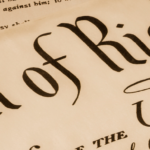What is a reasonable expectation of privacy?
A person has a reasonable expectation of privacy in their bedroom even if another person has a greater possessory right to the whole house, apartment, or premises.

A Reasonable Expectation of Privacy
In a rare win for the United States Constitution and the rights of American Citizens, the Sixth Circuit in United States v. Johnson, No. 09-6461 (Aug. 29, 2011), made a ruling that involved the search of the defendant’s bedroom over his express objection but with the consent of his wife and her mother, both of whom arguably had greater possessory interests in the home. The central issue in the case was the defendant’s reasonable expectation of privacy.
The court explained that “there is no reasonable dispute that the Defendant had a reasonable expectation of privacy in the bedroom, which he shared with his wife and which he used to store personal belongings.” Thus, because he “was present when the police arrived and . . . expressly objected to the search,” the court found under Georgia v. Randolph, 547 U.S. 103, 120 (2006), “the search of the bedroom was unreasonable . . . .”
The appellate court made clear that “Randolph does not distinguish among the ‘multiplicity of living arrangements,’” and thus that “Johnson’s express objection . . . was sufficient to render the search of the bedroom unreasonable as to him, notwithstanding the consent given by” his wife and his mother-in-law.
It is critical to understand that Fourth Amendment rights do not attach to a place, location, or object (like a car, bag, or person). Fourth Amendment Rights attach to a person. To assert a Fourth Amendment violation via a Motion to Suppress, the defendant must have personally had a “reasonable expectation of privacy” in the person or thing to be searched.

Frequently Asked Questions
Do I have a right to privacy?
Yes, the Constitution of the United States, more specifically the Bill of Rights, establishes several rights of privacy. The First Amendment provides freedom of religion and to keep that choice private. The Third Amendment creases the right to privacy of the home from a forced military residence. The Fourth Amendment aims to ensure the right of privacy against unreasonable searches and seizures by the government (law enforcement). Finally, the Fifth Amendment protects the privacy of personal information.
What is considered a reasonable expectation of privacy?
A person’s reasonable expectation of privacy, sometimes known as the “right to be left alone,” indicates that anyone who unreasonably and gravely jeopardizes another’s interest in maintaining their privacy may be held accountable for the exposure or intrusion.
What is the legal test for a reasonable expectation of privacy?
There is a two-part test for determining someone’s right to privacy. The first element is the person’s “subjective expectation” of privacy. The second element is whether that person has a “legitimate” expectation of privacy that society finds “reasonable.”
What is an invasion of privacy?
A person’s privacy has been invaded when someone or a corporation has violated it without permission.
What does the 4th Amendment protect against?
The Constitution, through the Fourth Amendment of the Bill of Rights, protects people from unreasonable searches and seizures by the government (generally law enforcement officers and agents). The Fourth Amendment, however, is not a guarantee against all searches and seizures, but only those deemed unreasonable under the law. Evidence seized during an unreasonable search under the 4th Amendment could be ruled inadmissible in court.
What is the Katz test?
The Katz Test determines whether there is an expectation of privacy upon which a person may rely “justifiably.”
What is the two-prong test?
The United States Supreme Court developed the two-prong test in Katz v. United States. The test analyzes the legal significance of a person’s right to privacy.
How is privacy defined in the Constitution?
Under the Constitution, a person has the right not to have personal matters disclosed or publicized and the right against undue government intrusion into fundamental personal issues and decisions. The various privacy rights have several limitations and depend on specific facts and circumstances.

Experienced Lawyers Who Can Seek Suppression
Our firm has lawyers who can seek suppression based on a violation of your reasonable expectation of privacy. The defense team with LEWIS & DICKSTEIN, P.L.L.C. consists of seasoned criminal defense veterans with decades of experience successfully defending clients in felony and misdemeanor cases. If the government has breached your reasonable expectation of privacy and illegally collected evidence against you, we can give you a strong, intelligent, and effective defense.
Call us today at (248) 263-6800 for a free consultation or complete an online Request for Assistance Form. We will contact you promptly and find a way to help you.












